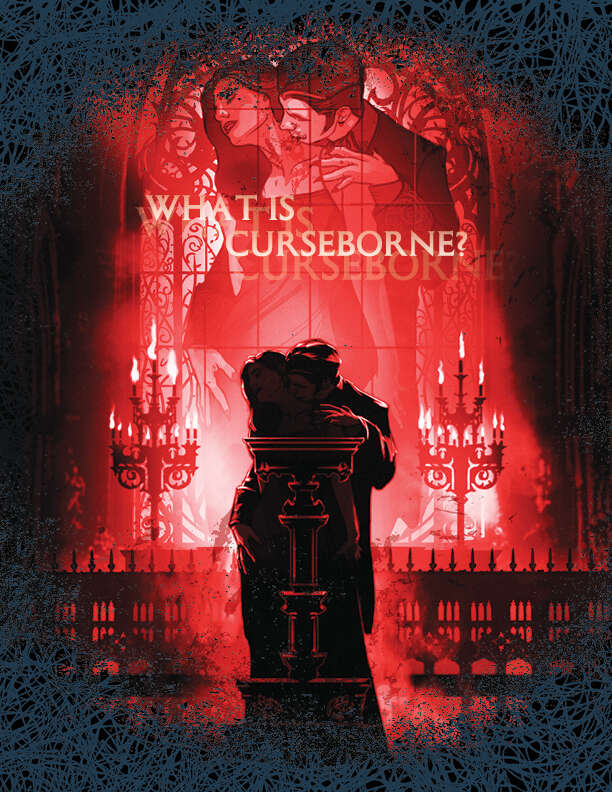
We’ve been hearing a lot of questions about what curses are, what curse dice are, and how the two interact. The last time we talked about the world of Curseborne, we talked about how the curse is everywhere and affects everyone. Characters who are damned have a moderate amount of control over the curse, and their Entanglement is a measure of that control. Effectively, Entanglement is how deep within the curse a character has embroiled herself. As she digs deeper into the world, the curse, and her own control over the curse, she becomes more inextricably bound to it.
So, let’s talk about the driving factor for most of what represents the curse in Curseborne: curse dice. I’m going to pull a few small excerpts from the text to help explain them, how they are used, and how they affect gameplay.
Using Curse Dice
An accursed’s nature changes her interaction with probability via curse dice. Possessing dice touched by the curse powers their Practices — or the manifestations of the curse’s magic — and alters the outcomes of her successes and failures. Successes grant her a little bit more than she bargained for while failures may look like a success but on none of the character’s terms.
As the nature of the curse transforms the character’s dice, they become either held or bled. Held dice persist in the pool and replace the character’s dice until an effect removes them, called bleeding. Some effects allow curse dice to exist indefinitely, while others use them right away. When a Practice or other effect bleeds curse dice, roll them as normal (typically supplementing an action such as an attack roll) and apply the effects of the curse as usual. Then, remove them from the pool.
What does that mean?
So, we see that you are either “holding” or “bleeding” curse dice to fuel your effects. Held dice are simply dice that exist in a pool. We suggest representing them with different colored dice kept near your sheet, or online as a separate dice roller (or dice within the roller if it has that capability). You are always rolling as many curse dice as possible when building a dice pool for literally anything your character can do. Even if you use a rolled power that requires you to bleed a curse die, you roll the curse die with your normal pool before removing it.
Removing curse dice is called bleeding, and you’ll need to bleed dice to perform all sorts of effects. If you’ve read through the Ashcan, you’re probably familiar with some of this language, but curse dice are intended to come and go readily, and we encourage you to take roleplay actions to gain curse dice so that you can use them later.

Wicked Successes and Cruel Failures
We’ve had some people ask if these are intended to be penalties for having curse dice, or punishment for taking action. Absolutely not. These represent the way your character’s life is just kind of cursed and weird all the time. They are not supposed to cause serious mechanical problems so much as narrative effects that drive story, introduce complicating factors, or escalate situations in ways that are indicative of a horror game.
You may be wondering why they apply to every single action a character takes. It’s because every action an accursed takes makes ripples and waves in the curse. She can’t just be a normal person. So even the normal things she does create weirdness. She can maybe pretend for a little bit that she can take mundane actions and be just like anyone else, but sooner or later, the curse catches up to her.
Curse dice are neither bad nor good. Having a lot of them comes with some risk. Having none of them comes with even greater risk. You’ll notice that the more embroiled in the curse your character becomes, the more curse dice she can hold in her pool, inviting more cursed effects every time she acts.
Tolerance
At each progressive stage of Entanglement, the character’s ability to control and use curse dice changes. Having curse dice in the pool, including temporary and accrued dice, is called holding dice. Use the following progression.
- Entanglement •: At this level, a character may hold up to 5 curse dice.
- Entanglement ••: The character may hold up to 7 curse dice.
- Entanglement •••: The character may hold up to 7 curse dice.
- Entanglement ••••: The character may hold up to 9 curse dice.
Running and Roleplaying Curses
Curses are intended to help reflect a type of horror genre where you are the monster, and you can’t control your monstrous nature. There’s no power without consequence, there’s no gain without risk, and there’s no getting away from your cursed existence.
That said, we don’t want games of Curseborne to feel oppressive. Wicked successes and cruel failures are ways to reflect the curse’s hold on a character, but ultimately, it’s up to the Storyguide to determine how much of an effect either one has on the current narrative. If they come up several times in a row, it might feel daunting to suddenly be dealing with 5 different twists and turns within the narrative.
I like to consider some things called escalations when thinking about how to handle wicked successes and cruel failures. You do not need to introduce an entirely new element to a scene, or come up with a shocking twist. Instead, escalate already present action. In a combat scene, maybe an enemy turns on one of their own allies for an indiscernible reason. Figuring that out might be the thread of your next story, or the players may simply accept the welcome reprieve. In a social scene, maybe a character that went from being relatively neutral towards the characters suddenly becomes frightened. Maybe they get a phone call and need to leave. Maybe a fight breaks out in the bar they’re talking in, and they all need to leave or risk getting sucked into it.
If you escalate the already present action, then you simply make things a little better, a little worse, or a little more complicated without having to come up with an entirely new story seed or scenario.


Interesting. I am glad these will not be mechanically intrusive and rather act as more story fuel, which I can appreciate.
I think Wicked Success should have a textual caveat that it cannot undo the intended purpose of the roll. For instance, if a person gets a Wicked Success while in Stealth, it should not ruin the stealth by drawing attention to the character. One possible example of how that might work is that the character finds themselves stealthing through or past a situation where they are tempted to intervene, perhaps a mugging or a domestic abuse case, but intervention would endanger their stealth. In this case, the stealth is not ruined, but they succeeded well enough that they find themselves in an awkward situation.
I think that *should* be obvious, but we might also change up the examples given in the final product to make it clear what kind of range of things might happen.
How come Entanglement 2 and 3 have the same Curse Dice maximum?
Because other things happen at those point breaks beyond increasing the curse dice maximum.
I am still a little confused. Do Curse dice always replace normal dice in your pool or only when they are Held?
They already replace dice in the pool until they are bled. “Held” means the state of having the dice in your pool.